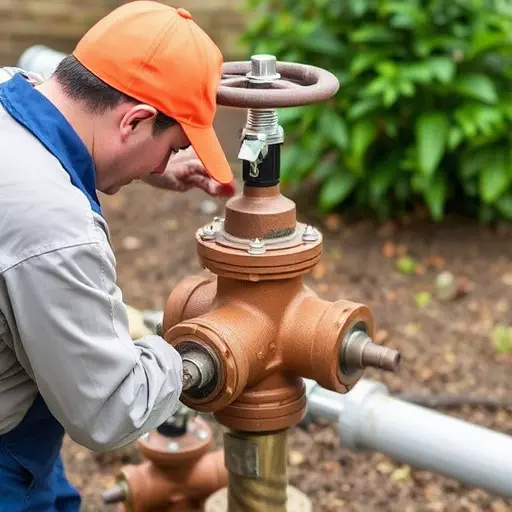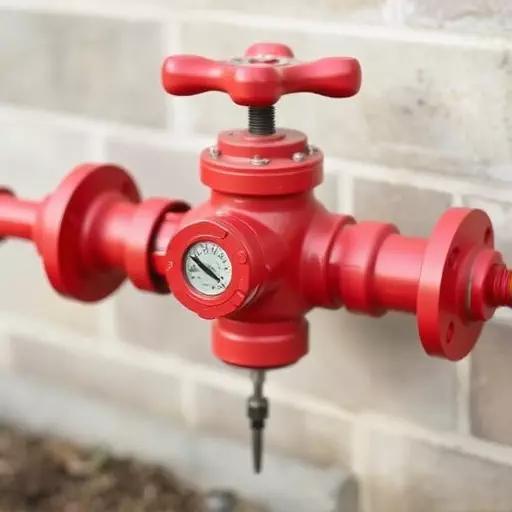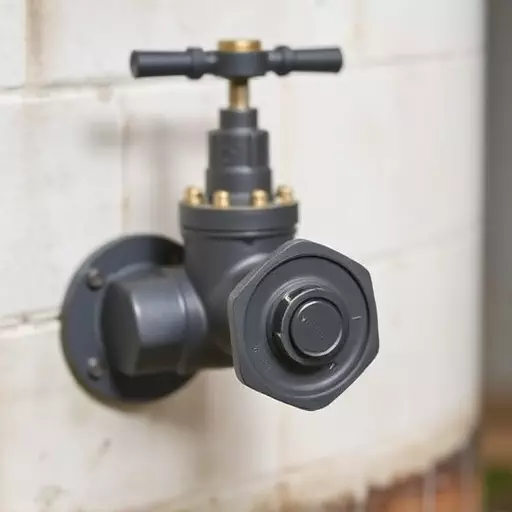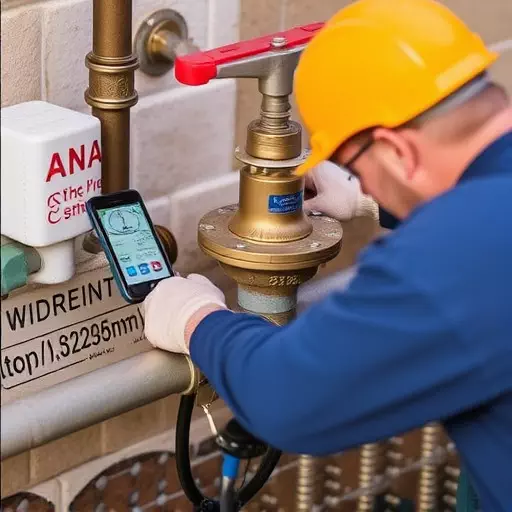In Spring Lake, annual backflow preventer testing is a mandated practice for all commercial entities to maintain the integrity of the community's drinking water supply and ensure compliance with local health and safety regulations. This process involves thorough visual inspections and performance evaluations by certified professionals, adhering strictly to manufacturer guidelines and local codes. Detailed records of these inspections are meticulously kept to provide a history of maintenance and enable prompt action should a backflow incident occur. The documentation also facilitates compliance with municipal ordinances and audits. This systematic approach underscores Spring Lake's commitment to water safety, as it ensures the effectiveness of backflow preventers, fosters transparency, and maintains accountability. Engaging with local authorities or professional services well-versed in the specific requirements for Backflow Preventer Testing in Spring Lake is essential for property owners to stay compliant and avoid potential legal issues or service disruptions related to water supply contamination concerns.
In Spring Lake, safeguarding water supply integrity is paramount, and a crucial aspect of this involves meticulous recordkeeping for backflow preventer testing. This article delves into the essential practices for annual backflow preventer testing, emphasizing the importance of compliance and professional service in maintaining the health and safety of our community’s water systems. We will explore the steps to establish effective protocols, the role of inspection services in commercial settings, and the best practices for recordkeeping to ensure adherence to local regulations. For Spring Lake residents and businesses, understanding how to manage backflow preventer records is not just a recommendation—it’s a commitment to public well-being and legal obligations.
- Understanding the Importance of Recordkeeping for Backflow Preventer Testing in Spring Lake
- Steps to Effective Annual Backflow Preventer Testing Protocols
- The Role of Professional Inspection Services in Commercial Backflow Preventer Maintenance
- Best Practices for Maintaining Accurate and Compliant Backflow Records
- Navigating Local Regulations and Documentation Requirements for Backflow Preventer Testing
Understanding the Importance of Recordkeeping for Backflow Preventer Testing in Spring Lake

In Spring Lake, maintaining a robust recordkeeping system for backflow preventer testing is indispensable for safeguarding public health and ensuring compliance with local regulations. Annual backflow preventer testing in Spring Lake is mandated to prevent contamination of the potable water supply, which can occur when backflow events happen due to sudden changes in water pressure. This meticulous process involves inspecting, testing, and maintaining devices installed at points where different piping systems interconnect to prevent backflow. For commercial entities in Spring Lake, this annual inspection is not just a regulatory requirement but a proactive measure to avoid costly repairs or health code violations. Proper documentation of these inspections provides a clear record of maintenance history, which can be crucial during audits or when addressing any water quality issues. It also facilitates timely and effective responses in the event of a backflow incident, ensuring the safety and well-being of the community’s water supply.
The importance of recordkeeping for commercial backflow preventer inspection in Spring Lake cannot be overstated. Not only does it ensure adherence to local laws and regulations, but it also helps in maintaining a transparent and accountable approach to water safety. These records serve as a historical log of the device’s performance and condition, enabling swift identification of any potential issues or trends that may require attention. By keeping precise and up-to-date records, Spring Lake businesses can operate with confidence, knowing they are meeting their legal obligations and protecting the health of their patrons and employees alike. This level of diligence not only contributes to the overall integrity of the water distribution system but also reinforces the trust between the community, service providers, and local authorities.
Steps to Effective Annual Backflow Preventer Testing Protocols

In adherence with municipal regulations and to safeguard the potable water supply in Spring Lake, businesses and property owners are mandated to conduct annual backflow preventer testing. This critical procedure is essential for ensuring that the commercial backflow preventer inspection is both thorough and compliant with industry standards. The process begins with a visual examination of the entire system, including all components such as valves, pipes, and the backflow device itself. This step is crucial for identifying any visible signs of wear, corrosion, or damage that could compromise the integrity of the system. Subsequently, the actual testing commences, where certified professionals apply specific pressure differentials to confirm the backflow preventer’s functionality. During this phase, devices are assessed for their ability to prevent contaminated or non-potable water from reversing flow direction into the drinking water system. The testing protocol adheres strictly to manufacturer guidelines and local codes, ensuring that each commercial backflow preventer inspection in Spring Lake is conducted with precision and accuracy. Upon completion of the test, a detailed report is generated, outlining the device’s performance and any maintenance or repairs required. This documentation serves as a record for both compliance purposes and as a tool for future reference to maintain the system’s reliability over time. By adhering to these effective annual backflow preventer testing protocols, Spring Lake’s water supply remains secure and its infrastructure compliant with health and safety regulations.
The Role of Professional Inspection Services in Commercial Backflow Preventer Maintenance

In the realm of commercial property maintenance, ensuring the safety and integrity of a building’s water system is paramount. A critical component of this task involves regular backflow preventer testing in Spring Lake. Professional inspection services play an indispensable role in maintaining these devices that protect public water systems from contamination caused by backflow. These specialized services not only adhere to stringent industry standards but also provide annual backflow preventer testing as mandated by local regulations. This consistent and thorough examination is essential for identifying potential issues before they escalate, thereby safeguarding the health and safety of occupants and complying with municipal codes. By engaging professional inspectors, property owners can rest assured that their commercial backflow preventer is functioning correctly, thus averting any disruptions in water service or the risk of cross-connection contamination. The expertise of these professionals ensures that each inspection is conducted with precision, utilizing specialized tools and techniques to test the backflow device’s effectiveness under various pressure conditions. This proactive approach to maintenance not only protects public health but also upholds the reputation of the business by maintaining operational excellence.
Best Practices for Maintaining Accurate and Compliant Backflow Records

Maintaining accurate and compliant records for backflow preventer testing is a critical component of water safety and regulatory compliance. In Spring Lake and beyond, businesses and properties with commercial backflow preventer systems are required to undergo annual backflow preventer testing to ensure these devices function correctly and protect the potable water supply from contamination. The first best practice in maintaining accurate records involves meticulous documentation of each test. For every event of testing, records should capture the date, time, location of the device, the name and certification number of the tester, a detailed description of the system’s condition, and any maintenance or repairs performed. This level of detail is essential for accountability and compliance with local, state, and federal regulations.
Furthermore, it is imperative to maintain these records in an organized and accessible manner. Whether maintained electronically or on paper, they should be easily retrievable for inspection by regulatory authorities. A systematic approach to recordkeeping can prevent disruptions during inspections and demonstrates a commitment to safety and compliance. It’s also advisable to establish a clear schedule for annual backflow preventer testing in Spring Lake, ensuring that reminders are set well in advance of the due date to avoid any lapses in compliance. By adhering to these best practices, property owners and managers can safeguard their systems against potential backflow incidents while maintaining transparency and accountability with regulatory bodies.
Navigating Local Regulations and Documentation Requirements for Backflow Preventer Testing

When managing a property with a backflow preventer in Spring Lake, adhering to local regulations and maintaining accurate documentation is paramount. Property owners and managers must be aware of the annual backflow preventer testing requirements specific to their locale. These tests are not just a routine procedure; they are a critical safety measure that ensures the potable water supply remains uncontaminated by any backward flow from irrigation or fire sprinkler systems. In Spring Lake, the regulations set forth by both local and state authorities dictate the frequency, methods, and record-keeping standards for commercial backflow preventer inspection. These guidelines often mandate detailed records of each test, including the date, time, testing method used, licensed tester’s qualifications, and any maintenance or repairs performed. This documentation is crucial not only for compliance with regulatory bodies but also for verifying the system’s integrity and for accountability in case of contamination incidents. Property managers must ensure that these records are kept up-to-date and readily accessible for inspection, as failure to comply can result in hefty fines or loss of water service. To navigate these requirements effectively, it is advisable to consult with local authorities or engage with professional services specializing in backflow preventer testing in Spring Lake. They can provide guidance on the specific documentation needed and help maintain compliance with all regulations, ensuring that your commercial property remains safe and within legal standards.


